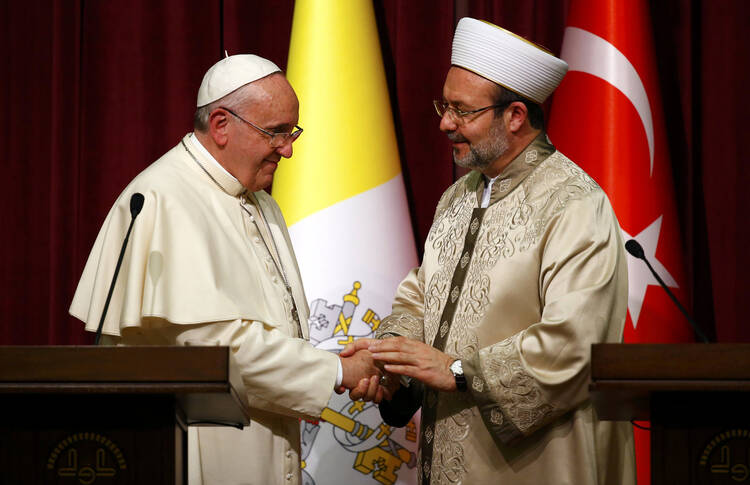Pope Francis prayed for some moments in the Sultan Ahmet Mosque in Istanbul on the second day of his visit to Turkey. He did so standing alongside the Grand Mufti of this city, head bowed, eyes closed.
“It was a moment of silent adoration”, the Vatican spokesman, Fr. Federico Lombardi S.J., who accompanied the Pope in the mosque, explained afterwards.
He revealed that Pope Francis twice told the Grand Mufti, “We must adore God, not just praise and glorify him.”
The prayer was part of a ‘beautiful moment’ of inter-religious dialogue, Fr. Lombardi commented. He explained that at one point the Grand Mufti said to the Pope, “God is a God of justice and of mercy. We are in agreement on this?” “I agree,” Pope Francis replied without hesitation.
The Jesuit Pope visited the mosque, known as the Blue Mosque because of the color of the tiles that decorate the interior of this beautiful building, soon after arriving in this city of 13 million people that straddles two continents - Europe and Asia, on the morning of November 29.
Welcomed by the Grand Mufti at the entrance to the mosque, the Pope took off his shoes and then entered, accompanied by the Grand Mufti, another mufti and two imams. One of them then explained the history and architecture of this magnificent mosque which was built between 1609 and 1612. He prayed after the Grand Mufti explained some verses of the Koran to him, and showed him where the mihrab is.
By praying in the Blue Mosque, Pope Francis confirmed yet again his great respect for Islam, one of the three great monotheistic religions in the world alongside Judaism and Christianity. As archbishop of Buenos Aires he had close links with Muslims, and last May he invited his friend, Omar Abboud, the Director of an Islamic Centre in that city, to accompany him on his visit to the Holy Land, together with Rabbi Skorka.
Francis’ prayer in the Blue Mosque will surely strengthen Catholic-Muslim relations in Turkey, where over 98 percent of its 76 million people are Muslim, and in a region where the overwhelming majority are Muslims too but where various people and forces try to manipulate religion for distinctly political goals.
By praying clearly in this way, the first Latin American pope confirmed the teaching of the Second Vatican Council that Muslims and Christians worship one and the same God. That council made this clear in its ‘Declaration on the Church’s relations to the non-Christian religions’ which was published in 1965.
His predecessor, Benedict XVI, also prayed here during his visit around the same time of year in November 2006. Six years earlier, John Paul II prayed at the tomb of St John the Baptist in the Grand Umayyad mosque in Damascus in 2001.
“It’s the physical gesture that people remember, and in his gesture of praying in the mosque before the mihrab he (Benedict XVI) communicated to Muslims something that he couldn’t communicate in words”, the Jesuit scholar on Islam, Fr. Thomas Michel told me in 2006 after Benedict XVI’s visit..
The same is even more true perhaps today, especially in a region where the Christian-Muslim relations are being tested by fire in the Middle East, and especially in Syria and Iraq.








